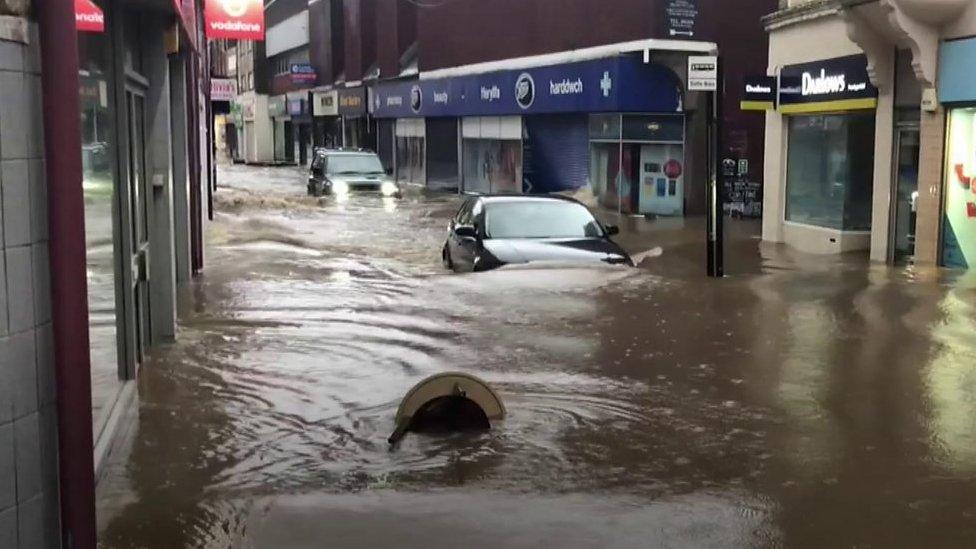Coal tip securing 'could cost more than £500m' in Wales
- Published
- comments
In February, 60,000 tonnes slipped down the hillside at Tylorstown
More than half a billion pounds could be needed to ensure the safety of 2,000 old coal tips in Wales over the next 10 years, the chancellor has been warned.
It follows calls for urgent action, following a 60,000 tonne landslide earlier this year in Rhondda.
Geologists said Wales was more prone to these incidents and climate change "may make that worse".
UK officials said they were working with the Welsh Government on flood relief, including funding for tips.
The incident above the village of Tylorstown followed heavy rain caused by Storm Dennis in February, which led to widespread flooding across areas including Rhondda Cynon Taf.
One historian said the landslide had evoked "visceral" emotions linked to the Aberfan disaster of 1966, which claimed the lives of 116 children and 28 adults.
A letter from Chris Bryant MP and Labour colleagues to Chancellor Rishi Sunak revealed unpublished details from a review led by the Welsh Government, with the co-operation of the Coal Authority, councils and Natural Resources Wales.
The review is compiling a list of all sites in Wales and their risk status, external.
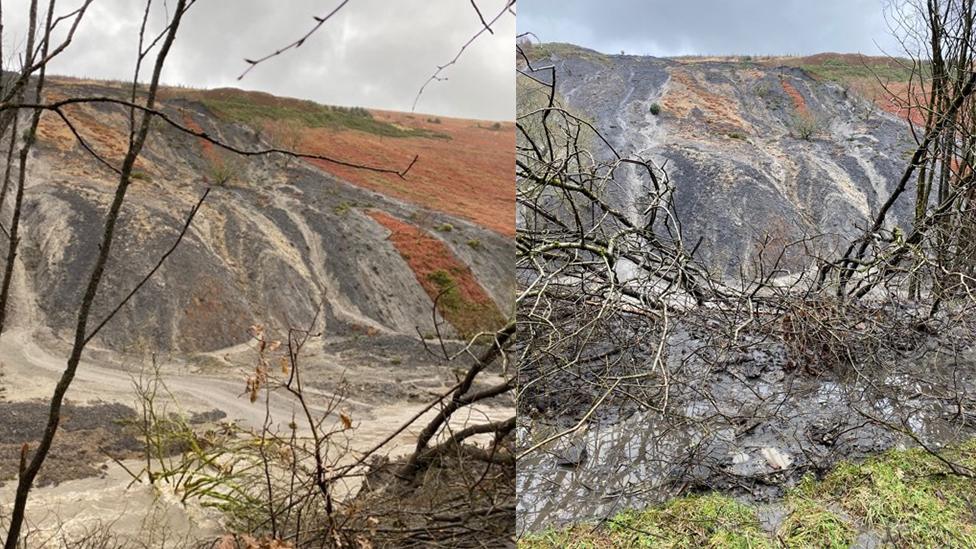
Mud and debris continued to fall on the hillside for days after the initial landslide
In October, the UK government provided £2.5m to help clean up and secure the Tylorstown site.
The Welsh Government said the cost of clear-ups and making Wales' coal tips safe was "significantly more".
Repair work in Rhondda Cynon Taf is estimated at £82.5m in total.
Mr Bryant and fellow Welsh Labour MPs Beth Winter, Chris Elmore and Alex Davies-Jones said it would be "unfair" for the "poorest communities in the UK to bear the full costs of this work".
They fear another Tylorstown-like incident if the framework for funding the work is not done soon.
The letter also calls for the UK government to provide financial assistance to Rhondda Cynon Taf for urgent repair work to bridges, roads and culverts following Storm Dennis.
The UK government has previously said it is up to the Welsh Government to remediate the coal tips and "get on" with flood defence work.
But in a new statement, officials added: "Ever since parts of Wales were hit by devastating flooding earlier this year, the UK government has been working with the Welsh Government and local authorities to provide extra support for flood relief and protection to the communities which were so badly affected.
"Responsibility for flood defences and flood management is devolved but, while all claims need to meet certain criteria, we expect to provide funding from the UK reserve for 2020-21."
It added: "This would include funds for coal tip repairs which we know are of particular concern to communities."
The Labour Member of the Senedd for Pontypridd, Mick Antoniw, said clearing coal tips "goes way beyond any responsibilities of the Welsh Government".
"The film of the coal sliding down brought back many, many traumatic memories for the population of Wales.
"And I think the wake-up call for us all is that the risk may be a bit greater than we thought it was, particularly if we're going to have more adverse weather like this."
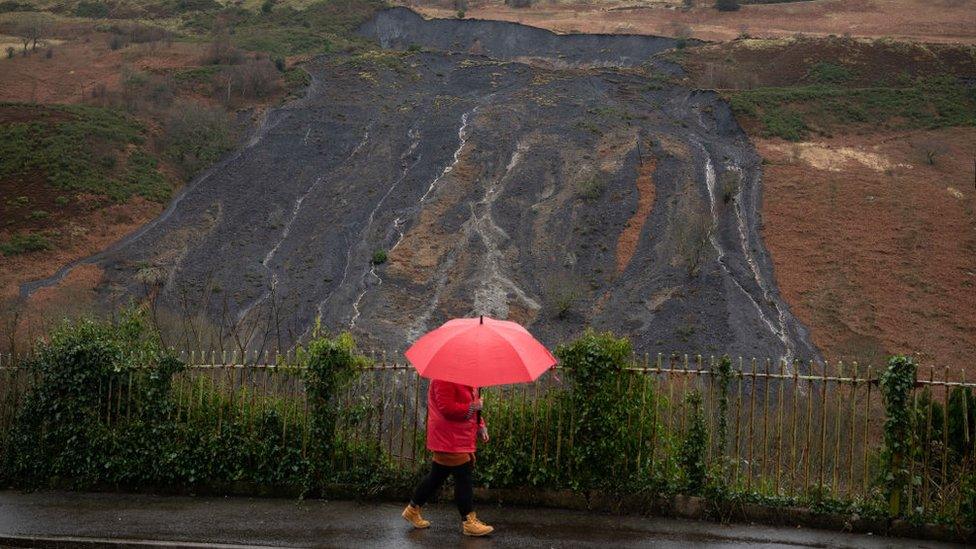
The Tylorstown landslide has left a scar on the hillside
Ben Curtis, a historian of the south Wales coalfields at Wolverhampton University, said incidents like the one at Tylorstown had a powerful impact.
"I visited the Tylorstown tip in the aftermath.
"Just struck by the scale of the landslip. It's really quite awe inspiring and not in a good way.
"These register so prominently with people because on a visceral level people in the valleys see a tip slide, and you think about the Aberfan disaster of course."
Ashley Patton, from the British Geological Survey, said the conditions in Wales made it more prone to these types of landslips.
"In south Wales we have the added pressure of a lot of coal waste sitting on top of those slopes which is unconsolidated material and can easily slip. Climate change may only make that worse.
"With increased storms like the ones we saw at the beginning of this year, landslides, which is what you'd expect with climate change, is going to be a real problem."
The Welsh Government said the safe management of coal tips "remains a priority".
"While we welcome recent announcements by UK government, along with their recognition that the longer-term costs will be significant, no further funds have been forthcoming, and we continue to press them for the full amount of funding needed, as promised by the prime minister," said a spokesman.
- Published25 June 2020
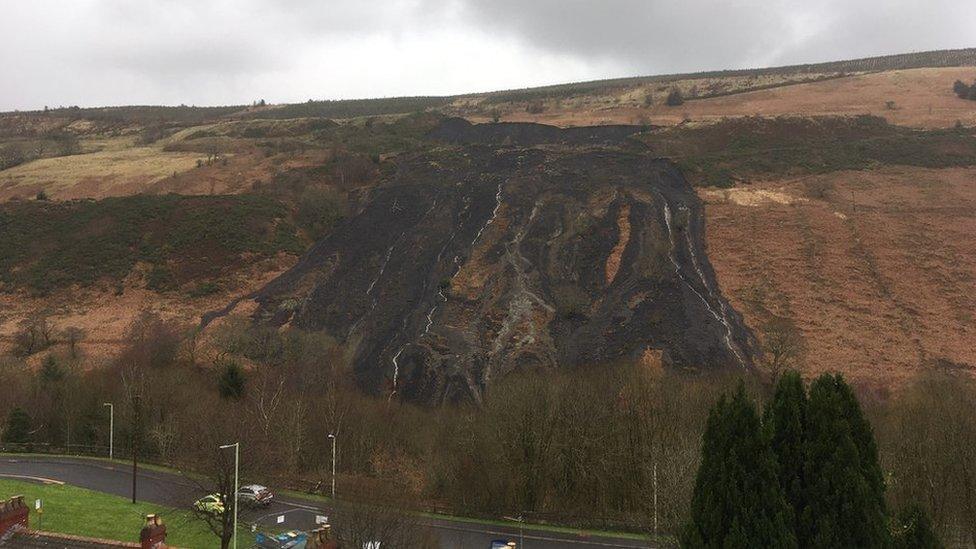
- Published16 February 2020
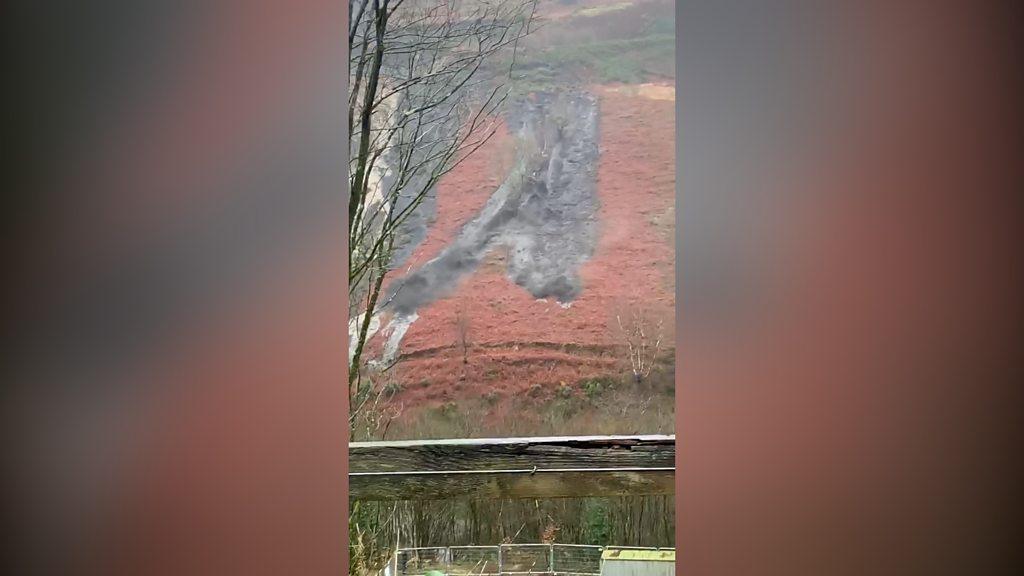
- Published16 February 2020
